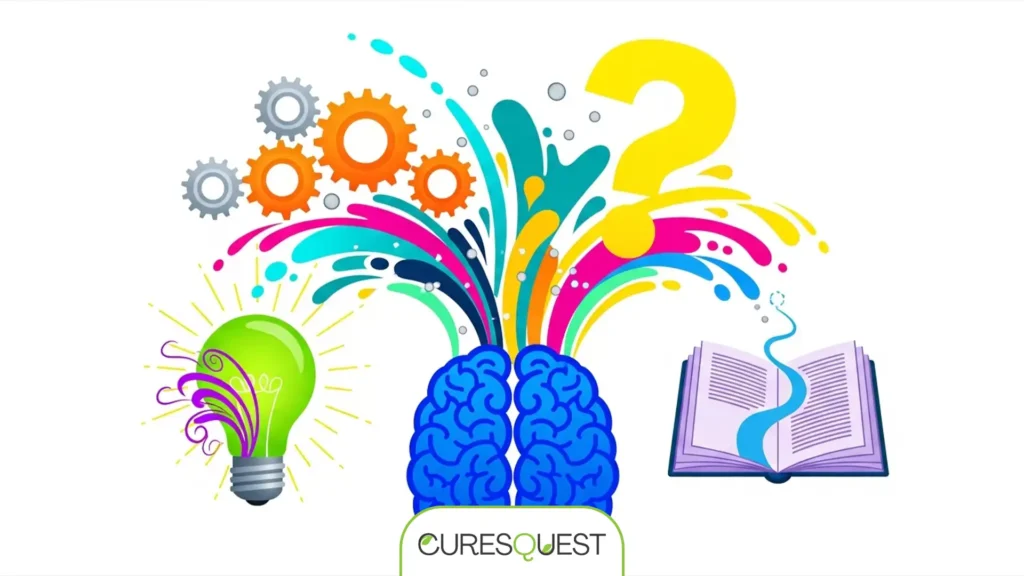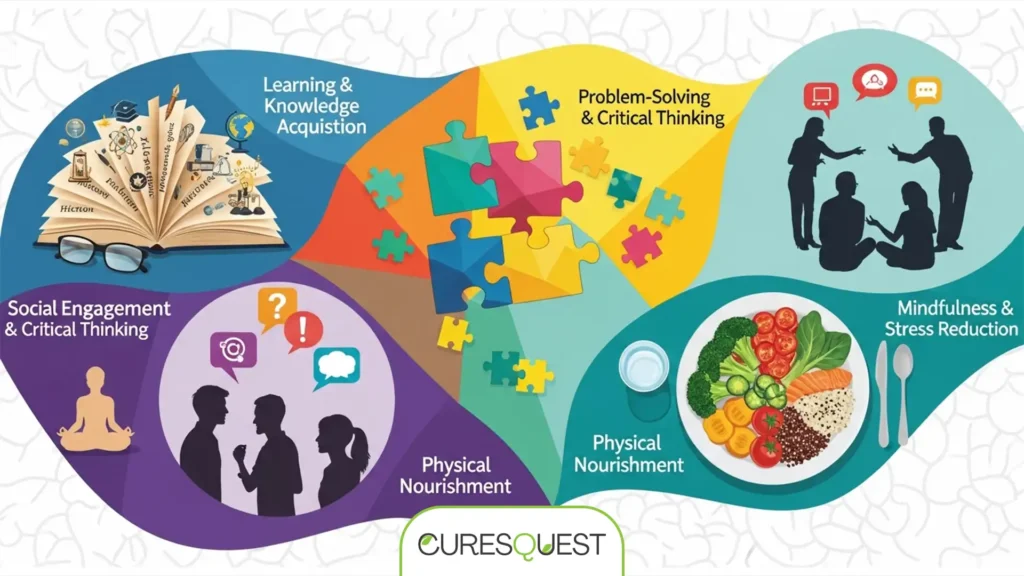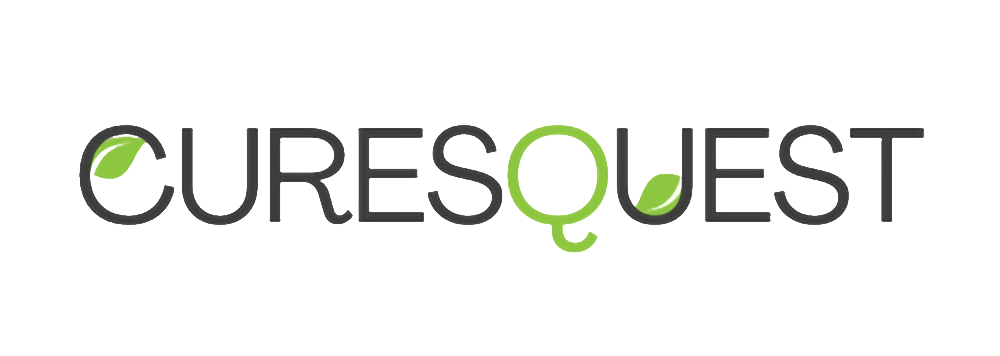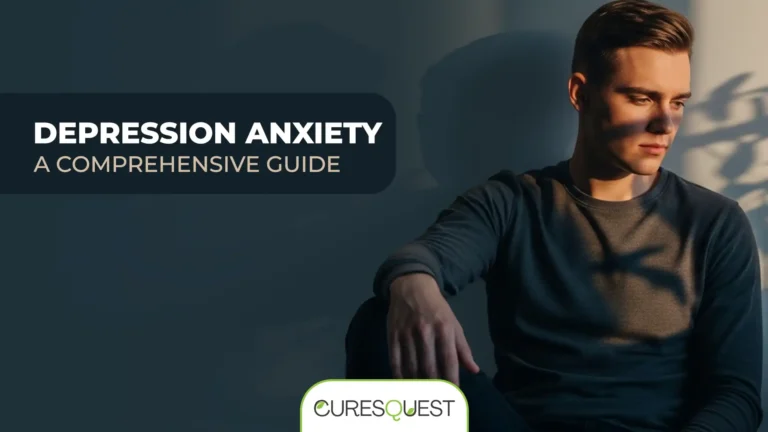In our fast-paced, information-rich world, we often hear about physical and mental health, but what about the health of our intellect? Intellectual health is a vital, yet frequently overlooked, dimension of overall well-being. It’s not just about academic prowess or IQ scores; it encompasses a vibrant curiosity, a commitment to lifelong learning, and the ability to think critically and creatively. Nurturing your intellectual health means actively engaging your mind, expanding your knowledge, and embracing new ideas and experiences. It’s about maintaining cognitive wellness and ensuring your brain remains agile and adaptable throughout your life.
Imagine your mind as a muscle. Just like any other muscle, it needs regular exercise, proper nutrition, and adequate rest to stay strong and functional. Neglecting your intellectual well-being can lead to stagnation, reduced mental acuity, and even a diminished sense of purpose. Conversely, investing in your intellectual growth can unlock new potentials, foster innovation, and enrich every aspect of your existence. This comprehensive guide will delve deep into what intellectual health truly means, why it’s indispensable for a fulfilling life, and provide actionable strategies to cultivate a sharp, engaged, and resilient mind. Get ready to embark on a journey that will transform your cognitive function and enhance your capacity for critical thinking and problem-solving.
Table of Contents
What Exactly is Intellectual Health?
At its core, intellectual health refers to the state of your mind’s well-being, characterized by an active engagement with the world of ideas and a continuous pursuit of knowledge. It’s one of the eight dimensions of wellness, distinct from mental health, which often focuses on emotional stability and psychological well-being. While interconnected, intellectual health specifically emphasizes the cognitive aspects of human experience. It’s about having an open mind, a thirst for learning, and the capacity to adapt to new situations and challenges. Think of it as the continuous development of your cognitive capabilities and intellectual development.
Key components of robust intellectual health include:
- Curiosity: A natural desire to explore, understand, and learn new things.
- Critical Thinking: The ability to analyze information objectively, identify biases, and form reasoned judgments.
- Creativity: The capacity to generate new ideas, solve problems innovatively, and express oneself uniquely.
- Open-mindedness: A willingness to consider different perspectives and challenge one’s own assumptions.
- Lifelong Learning: A commitment to continuous personal and professional development through acquiring new knowledge and skills.
- Problem-Solving Skills: The aptitude to effectively identify, analyze, and resolve complex issues.
- Memory and Focus: Maintaining strong cognitive function through attention and recall.
Understanding these elements helps us appreciate that intellectual health is not a fixed state but an ongoing process of growth and engagement. It’s about actively exercising your brain health and fostering an environment where your mind can thrive. For more insights into these dimensions, resources like those from Southeastern Oklahoma State University or Harvard University Health Services provide excellent frameworks.

Why Prioritize Your Intellectual Health? The Profound Benefits
Investing in your intellectual health yields a multitude of benefits that permeate every facet of your life. It’s not merely about accumulating facts; it’s about enhancing your overall cognitive wellness and capacity to navigate the complexities of modern existence. Here are some profound advantages:
Enhanced Problem-Solving and Decision-Making
A sharp intellect equips you with superior analytical thinking skills, enabling you to dissect complex problems, evaluate various solutions, and make informed decisions more effectively. This cognitive function is invaluable in both personal and professional contexts, from navigating daily challenges to strategizing for long-term goals. Developing your critical thinking muscles directly translates into more efficient and successful outcomes.
Improved Memory and Focus
Regular mental stimulation, much like physical exercise, strengthens neural pathways and boosts cognitive reserve. This leads to better memory retention, improved concentration, and a greater ability to focus on tasks without distraction. As we age, maintaining brain fitness through intellectual engagement becomes crucial for preserving mental acuity and reducing the risk of cognitive decline.
Greater Adaptability and Resilience
An open and curious mind is inherently more adaptable. When you’re constantly learning and engaging with new ideas, you become more comfortable with change and better equipped to adjust to unforeseen circumstances. This mental flexibility fosters resilience, allowing you to bounce back from setbacks and approach new challenges with confidence and a growth mindset. Northwestern University’s wellness resources often highlight the importance of adaptability.
Increased Creativity and Innovation
Intellectual health is a fertile ground for creativity. By exposing yourself to diverse perspectives and continuously learning, you create a rich mental library from which innovative ideas can spring. This isn’t limited to artistic endeavors; it applies to finding novel solutions at work, inventing new ways to approach personal projects, and fostering a spirit of innovation in all areas of life.
Reduced Risk of Cognitive Decline
Studies consistently show that individuals who maintain active intellectual lives have a lower risk of developing age-related cognitive impairments. Engaging in mentally stimulating activities helps build cognitive reserve, essentially providing your brain with a buffer against neurological challenges. This underscores the importance of lifelong learning for long-term brain health.
Personal and Professional Growth
Ultimately, prioritizing your intellectual health is a direct investment in your personal and professional development. It empowers you to expand your horizons, acquire new skills, and continually evolve. This ongoing intellectual growth can lead to greater career opportunities, deeper personal fulfillment, and a more profound understanding of yourself and the world around you. Illinois State University emphasizes how intellectual wellness is a path to a happier life.

Key Pillars of a Robust Intellectual Health Strategy
Cultivating strong intellectual health requires a multifaceted approach, integrating various practices into your daily life. Here are the fundamental pillars:
Lifelong Learning and Continuous Education
The pursuit of knowledge should never cease. Lifelong learning isn’t just about formal education; it encompasses every opportunity to acquire new information or skills. This could mean:
- Reading Widely: Devour books, articles, and reputable news sources across various genres and subjects.
- Taking Courses: Enroll in online courses (MOOCs), workshops, or community college classes on topics that pique your interest.
- Learning a New Language: This is a powerful brain exercise that enhances cognitive flexibility.
- Mastering a New Skill: Whether it’s coding, playing an instrument, or woodworking, learning complex skills challenges your brain.
Regularly exposing your mind to novel information and tasks is paramount for cognitive wellness. As A Change for Better suggests, continuous learning is a cornerstone of intellectual well-being.
Cultivating Curiosity and Open-Mindedness
These two traits are the engines of intellectual exploration. A curious mind is always asking “why?” and “how?”, while an open mind is receptive to answers that might challenge existing beliefs. To foster them:
- Ask Questions: Don’t just accept information at face value. Dig deeper.
- Explore New Ideas: Seek out perspectives different from your own, engage with diverse cultures, and challenge your assumptions.
- Travel: Exposure to new environments and cultures broadens your worldview and stimulates your intellect.
- Engage in Socratic Dialogue: Discuss complex topics with others, actively listening and questioning.
Embracing curiosity fuels your desire for intellectual development and keeps your mind vibrant.
Engaging in Critical Thinking and Problem-Solving
These are not just academic skills; they are essential for navigating life effectively. To sharpen them:
- Analyze Information: Practice evaluating sources, identifying logical fallacies, and discerning fact from opinion.
- Solve Puzzles and Brain Teasers: Sudoku, crosswords, chess, or strategic video games can be excellent mental workouts.
- Debate and Discuss: Engage in respectful discourse on complex topics, formulating arguments and defending positions logically.
- Practice Lateral Thinking: Look for unconventional solutions to everyday problems.
These practices enhance your analytical thinking and mental flexibility.
Fostering Creativity and Innovation
Creativity is often seen as an artistic trait, but it’s a vital component of intellectual health that applies to all fields. To boost your creative output:
- Brainstorm Regularly: Dedicate time to generate ideas without judgment, for any problem or project.
- Engage in Artistic Pursuits: Whether it’s painting, writing, music, or gardening, creative hobbies stimulate different parts of your brain.
- Change Your Routine: New experiences and environments can spark fresh perspectives.
- Practice Divergent Thinking: Explore multiple solutions to a single problem.
Creativity is a powerful tool for intellectual growth and personal expression.
Sustaining Mental Stimulation and Cognitive Engagement
Beyond formal learning, daily activities can keep your mind sharp and engaged:
- Meaningful Conversations: Engage in discussions that challenge your thoughts and expose you to new ideas.
- New Hobbies: Pick up a hobby that requires focus, strategy, or learning new patterns.
- Volunteer: Engage with your community in ways that require planning, interaction, or problem-solving.
- Mindfulness and Meditation: These practices can improve focus and clarity, reducing mental clutter and enhancing cognitive function.
These activities contribute significantly to your cognitive wellness and overall brain fitness.
The Role of Rest, Nutrition, and Physical Activity
You cannot have a healthy intellect without a healthy body. The mind-body connection is undeniable:
- Adequate Sleep: Sleep is crucial for memory consolidation, cognitive restoration, and overall brain health. Aim for 7-9 hours.
- Brain-Boosting Nutrition: A diet rich in omega-3 fatty acids, antioxidants, vitamins, and minerals supports optimal brain function. Think leafy greens, berries, fatty fish, and nuts.
- Regular Physical Activity: Exercise increases blood flow to the brain, promoting neurogenesis (the growth of new brain cells) and improving mood, which in turn supports cognitive performance. Even a brisk walk can make a difference.
These foundational elements are essential for sustaining mental acuity and intellectual growth. The McMillen Health Center often highlights the holistic nature of wellness, including these factors.

Practical Strategies to Boost Your Intellectual Health Daily
Ready to integrate intellectual health into your daily routine? Here are some practical, actionable strategies:
| Activity | Key Intellectual Health Benefit | Suggested Daily/Weekly Time Commitment |
|---|---|---|
| Read a chapter of a non-fiction book or a complex article | Expands knowledge, improves vocabulary, stimulates critical thinking | 15-30 minutes daily |
| Solve a challenging puzzle (Sudoku, crossword, logic puzzle) | Enhances problem-solving skills, boosts memory and focus | 10-20 minutes daily |
| Learn 5 new words or a few phrases in a new language | Increases cognitive flexibility, improves memory recall | 5-10 minutes daily |
| Engage in a deep conversation about a thought-provoking topic | Develops analytical thinking, fosters open-mindedness, sharpens communication | 30-60 minutes a few times a week |
| Watch a documentary or an educational Ted Talk | Broadens perspective, introduces new ideas, sparks curiosity | 20-60 minutes a few times a week |
| Try a new creative activity (drawing, writing, playing an instrument) | Stimulates creativity, reduces stress, enhances divergent thinking | 30-60 minutes a few times a week |
| Reflect and journal on new insights or challenges faced | Improves self-awareness, consolidates learning, enhances problem-solving | 10-15 minutes daily |
Beyond these, consider setting specific intellectual goals. Perhaps you want to understand quantum physics, learn to code, or master the art of debate. Break these larger goals into smaller, manageable steps. Consistency is key. Just as you wouldn’t expect to run a marathon after one day of training, intellectual growth is a gradual process that compounds over time. Benedictine Living Community provides 7 ways to increase your intellectual wellness, many of which involve daily habits.

Common Challenges to Intellectual Health and How to Overcome Them
While the path to robust intellectual health is rewarding, it’s not without its obstacles. Recognizing these challenges is the first step toward overcoming them.
Information Overload and Digital Distraction
In the digital age, we’re constantly bombarded with information, much of it superficial or irrelevant. This can lead to decision fatigue, reduced attention spans, and a shallow understanding of complex topics. The constant ping of notifications and endless scrolling are detrimental to deep intellectual engagement.
- Solution: Practice digital detoxes. Schedule dedicated “deep work” or “deep learning” blocks. Curate your information sources, focusing on high-quality, reputable content. Learn to say no to distractions.
Fear of Failure or Judgment
Many people shy away from new learning experiences or intellectual challenges due to a fear of making mistakes, appearing unintelligent, or being judged by others. This can stifle curiosity and prevent intellectual exploration.
- Solution: Embrace a growth mindset. Understand that mistakes are opportunities for learning. Focus on personal progress rather than external validation. Start small and celebrate incremental successes. Seek supportive learning environments.
Lack of Time or Perceived Busyness
In our busy lives, intellectual pursuits often take a backseat to work, family, and other commitments. It can feel like there’s simply no time for “extra” learning or deep thought.
- Solution: Prioritize and schedule. Even 15-30 minutes a day dedicated to intellectual activities can make a significant difference. Integrate learning into existing routines (e.g., audiobooks during commutes). View intellectual health as an investment that enhances productivity and well-being, not a chore.
Cognitive Biases and Confirmation Bias
Our brains are wired with cognitive shortcuts that can lead to biases, such as confirmation bias (seeking out information that confirms existing beliefs) or anchoring bias. These biases can hinder open-mindedness and critical thinking.
- Solution: Actively seek out dissenting opinions and diverse perspectives. Practice critical self-reflection. Engage in debates with an open mind, focusing on understanding rather than just winning. Deliberately challenge your own assumptions.
Overcoming these hurdles requires conscious effort and a commitment to continuous self-improvement, but the rewards for your intellectual health are immeasurable.

Intellectual Health Across the Lifespan
Intellectual health is not just for students or academics; it’s a dynamic process that evolves and remains crucial throughout every stage of life. Each phase presents unique opportunities and challenges for cognitive growth and engagement.
Childhood Development
In early childhood, intellectual health is fostered through play, exploration, and sensory experiences. Encouraging curiosity, asking open-ended questions, and providing a stimulating environment lay the foundation for future cognitive development. Reading aloud, engaging in imaginative play, and introducing basic problem-solving games are vital. Early exposure to diverse concepts and languages can significantly boost cognitive reserve.
Adolescent Growth
Adolescence is a period of intense brain development, marked by the refinement of critical thinking, abstract reasoning, and identity formation. Supporting intellectual health during this stage involves encouraging independent thought, fostering a love for learning beyond the classroom, and providing opportunities for creative expression and debate. Challenging academic pursuits, engaging in extracurricular activities like robotics or debate clubs, and exploring personal interests all contribute to intellectual growth.
Adult Maintenance and Enhancement
For adults, intellectual health often shifts from formal education to self-directed learning and practical application. It involves staying current in one’s field, learning new professional skills, and engaging in hobbies that provide mental stimulation. Continuous learning, adapting to new technologies, and maintaining social connections that offer intellectual discourse are key. Balancing work demands with personal intellectual pursuits is essential to prevent burnout and maintain cognitive wellness. The University of New Hampshire highlights adult intellectual wellness as a key component of overall health.
Senior Cognitive Resilience
As we age, maintaining intellectual health becomes even more critical for preserving cognitive function and quality of life. Engaging in mentally stimulating activities, learning new skills (even small ones like a new recipe or a simple game), and staying socially connected can significantly impact cognitive resilience. Regularly challenging the brain helps to build and maintain neural pathways, potentially delaying the onset of age-related cognitive decline. Activities like volunteering, mentorship, and pursuing long-held interests are excellent ways for seniors to nurture their intellectual health. The City of Newport News provides resources for intellectual wellness that often apply to all ages, including seniors.
Regardless of age, the commitment to intellectual health is a journey of continuous discovery, adaptation, and enrichment. Project School Wellness provides a useful framework for understanding wellness basics including intellectual health that can be applied across different life stages.
Frequently Asked Questions About Intellectual Health
Is intellectual health the same as mental health?
No, while closely related and often intertwined, intellectual health and mental health are distinct. Mental health primarily deals with emotional, psychological, and social well-being (e.g., managing stress, mood disorders). Intellectual health, on the other hand, focuses on cognitive aspects like curiosity, critical thinking, lifelong learning, creativity, and problem-solving skills. Both are crucial for overall well-being, and strengthening one often positively impacts the other.
How can I improve my critical thinking skills?
To improve critical thinking, practice analyzing information from various sources, questioning assumptions (including your own), and looking for logical fallacies. Engage in debates, solve logic puzzles, and try to understand different perspectives on complex issues. Regularly reflecting on your decision-making processes can also help identify areas for improvement.
What are some simple daily habits for boosting intellectual health?
Simple daily habits include reading a chapter of a book, learning a new word, solving a crossword puzzle, listening to an educational podcast during your commute, engaging in a meaningful conversation, or trying to understand a new concept. Consistency is more important than intensity. Even short bursts of mental stimulation can make a difference.
Can intellectual health decline with age?
While some aspects of cognitive function, like processing speed, may naturally slow down with age, significant intellectual decline is not inevitable. Actively engaging in mentally stimulating activities, maintaining a healthy lifestyle (diet, exercise, sleep), and staying socially connected can help preserve and even enhance intellectual health throughout your senior years, building cognitive reserve.
How does diet affect intellectual health?
Diet plays a significant role. A balanced diet rich in omega-3 fatty acids (found in fish), antioxidants (berries, leafy greens), and B vitamins supports brain function, memory, and concentration. Conversely, diets high in processed foods and sugar can impair cognitive performance and increase inflammation, negatively impacting brain health. Hydration is also crucial.
Are video games good for intellectual health?
Certain video games, particularly strategy, puzzle, and role-playing games, can offer significant intellectual benefits. They can improve problem-solving skills, reaction time, spatial reasoning, and decision-making. However, balance is key; excessive gaming can lead to sedentary behavior and social isolation, so moderation and choosing cognitively challenging games are important.
How can I encourage intellectual health in my children?
Encourage curiosity by answering their “why” questions, reading aloud, and providing opportunities for imaginative play. Expose them to diverse experiences, foster a love for learning by making it fun, and teach them to question and think critically rather than just memorize. Limit screen time and promote activities that require active engagement and problem-solving.
Conclusion: Embrace Your Journey to Lifelong Intellectual Vitality
Intellectual health is far more than just being smart; it’s about cultivating a dynamic, engaged, and adaptable mind throughout your entire life. It’s the continuous pursuit of knowledge, the joy of critical thinking, and the boundless freedom of creativity that enriches your existence. By consciously prioritizing your cognitive wellness, you’re not only enhancing your problem-solving abilities and memory but also building resilience against cognitive decline and fostering profound personal and professional growth. The strategies outlined in this guide—from lifelong learning and cultivating curiosity to ensuring adequate rest and nutrition—are not merely suggestions; they are pathways to a more fulfilling and vibrant life.
Remember, the journey to optimal intellectual health is ongoing. It requires consistent effort, an open mind, and a willingness to step outside your comfort zone. Embrace new challenges, question the status quo, and never stop exploring the vast landscape of human knowledge. Your mind is your most powerful asset; nurture it, challenge it, and watch as it unlocks incredible potential. Start today, with one small step, and commit to mastering your mind for a lifetime of intellectual vitality. Your future self will thank you for investing in your most valuable resource: your brain.









